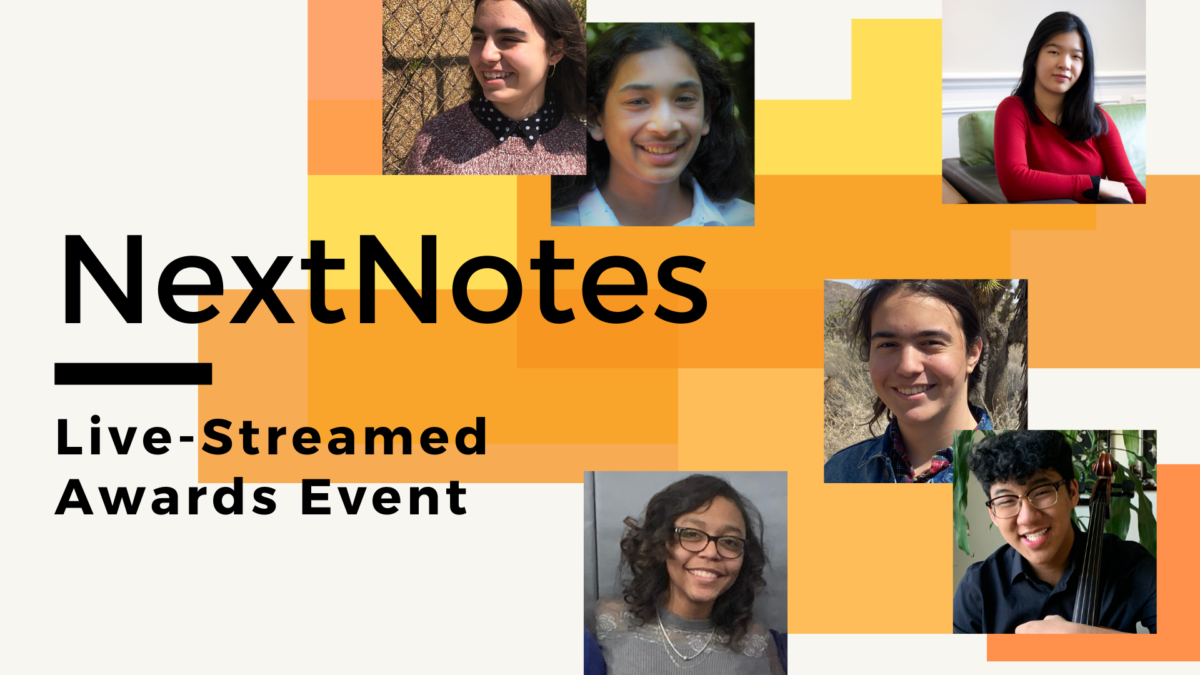Wednesday, June 24th, 2020

Rohan Srinivasan is a recipient of the 2020 NextNotes High School Music Creator Award
Rohan Srinivasan is a curious listener and is already an accomplished award winning composer as a junior in HS. He has been a part of the Young Composers Project in Portland where he attends Sunset High School. As part of the Young Composers project, Rohan is given the opportunity to write music for professional musicians who workshop his piece in three sessions before performing it in a concert. His winning piece for the Penn State Young Composers Contest began in this workshop.
Rohan began playing cello in 4th grade but it wasn’t until 7th grade that he started to recognize the names of composers and started exploring music further.
“I realize I was playing simplified versions of the pieces because I was technically able to play pieces that were actually composed for the cello. And I wanted to play things that were originally written for the cello. So, I started picking these pieces and trying to learn them but they were very difficult.”
Eventually, Rohan decided that he enjoyed composing his own music more than playing music by others. He was 12 years old. Rohan has not considered revisiting those early pieces.
In Rohan’s early explorations in composition, He began listening to composers across a wide spectrum of musical history and didn’t really associate any of the compositions with any particular era.
“I was listening to a lot of music and I came across some names and ended up listening to a lot more recent composers before Romantic era composers. Like for example, I know that I heard this piece by Schoenberg before I heard anything by Brahms. I think the fact that I was introduced to dissonant music early on means that I am less annoyed by some dissonant sounds.
“I had never written a piece that was in a key signature. I didn’t have a teacher until 2 years ago and I was mainly writing things by ear. It wouldn’t be tonal music and it wouldn’t be following a system either. I think that hearing the modern pieces early meant that I got to appreciate them without all of the theory stuff because if you start looking up the theory, you may not appreciate the music just for the music.”
Rohan’s father is a big fan of Indian classical music and has a very good ear for music. Rohan likes to introduce him to contemporary composers, but also feels the need to learn more about Indian Classical music.
“I was born here and I guess you could say that I am composing in the Western tradition but I think there is a lot I could learn from Indian Classical music that I should try to bring in. There is a kind of pressure to bring those elements in.”
He doesn’t feel like he would market himself as an Indian-American composer but he feels that that label will be there no matter what he does. He confesses that he is still figuring that all out.
A Dialogue for Cello and Piano began as an assignment from his teacher in which he challenged Rohan to write a piece that was diatonic using some type of scale.
“I write by ear and usually I try to use my ear to keep whatever harmonic language consistent throughout the piece. But sometimes it’s crazy and all over the place. So, he wanted me to refine that a little and force myself to write something with a tonic.”
In this piece, Rohan found himself creating tension through rhythm where he typically uses dissonance for that purpose.
“I play drums. I have always been interested in rhythmic things. And I play drums in the jazz band and there are a lot of interesting things you can do with rhythm in jazz that you can bring to classical music. So, that’s what I tried to do with [A Dialogue]. It has all of these complex polyrhythms.”
Jazz is a relatively new exploration for Johan and just like in his classical music listening, he prefers the stuff that is “out there”. He is inspired by composers like Henry Threadgill who live in that grey area not defining the style of music that he plays.

Join us on Saturday, June 27, 2020 at 7:30pm CDT as, for the first time, NextNotes will culminate in a live-streamed awards ceremony emceed by public radio and podcast creator of Trilloquy, Garrett McQueen. The ceremony will celebrate Charlotte and the other five talented creators who were selected from over 140 across the US and represent the skill and range of music being created today. Learn about their experience as part of this year’s cohort and hear samples from the award winning creations. Livestream the ceremony here.
The NextNotes High School Music Creator Awards are generously supported by The Augustine Foundation, the Rosemary and David Good Family Foundation, The Thelma Hunter Fund, the Dr. Fred Noah Gordon Charitable Fund of The Minneapolis Foundation, and other generous individuals.